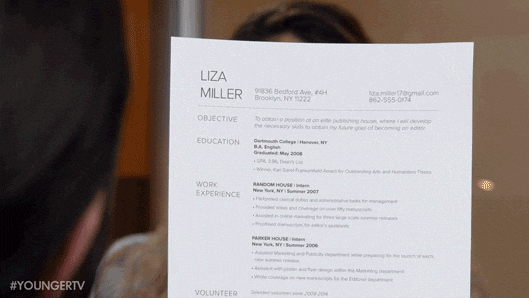We all know allocating college funding makes up 90% of the headache that comes with applying to an institution. All the different applications, the waiting and figuring out how other costs like books and supplies will pay for themselves? Exhausting. It becomes even more frustrating when you decide to continue your education and go to graduate school. Funding becomes a daily scavenger hunt with deadlines that haunt you along the way. The most efficient way to go about securing funds for graduate school is the graduate assistant position. I know, the process gets competitive, but not impossible! The position normally provides tuition remission plus stipend, and the application proves much simpler than you think.
Use this easy guide to help you navigate and nail your GA application!
Apply to all of them

First thing’s first, cease every opportunity you can! Oftentimes, students who apply for graduate assistantships think they can only apply/receive one in their department. I’m here to tell you that you should apply everywhere! If you major in biology, you could land yourself an assistantship with campus activities or even a university’s writing center.
“When I first started my GA applications, I applied to the different bio departments of the schools I was applying to. I thought I would only get accepted there because that was my major. I ignored the other links on the application webpage, and I regret it because I could have received an assistantship with a random campus office,” St. John’s University graduate student Tiana Jordan said.
It’s all about your application, which provides a great way to practice selling yourself. This can be extremely useful in grad school when applying for jobs and networking with other students and faculty. A lot of your experience will consist of getting comfortable with the graduate community. Practice getting yourself out there by exploring all your options!
Get closer with faculty in the department

If you read this after your senior year started already, make it a point to say hello to a new faculty member every day—even after you apply. While most universities maintain a committee that decides which students receive the graduate assistantship, the committee usually still consults with the whole department. The more relationships you build with professors, the more people that vouch for you when deciding.
In the case that you don’t obtain your masters in the same institution you attended for undergrad, find the emails of the department faculty at the different schools you want to apply to immediately. Introduce yourself, specifically to those programs or professors with the same research or teaching interests as you. Let them know of your interest in the program and the current interests you hold in your field. Know about their experiences and research also. Like, really know.
For freshmen, sophomores, and juniors, I really need to stress this: these days it’s all about who you know, and universities always look for hungry students that work hard. Establishing relationships with faculty during your undergraduate years helps you in every aspect of getting your bachelors and what you decide to do with your future. Understanding tough topics in class, letters of recommendation, advising and mentoring; just a few amongst the many perks that come with getting to know faculty.
Apply as Early as possible

This goes for any opportunity that requires an application. Memorize that deadline and apply as early as possible. The first batch of entries draws in the eyes of faculty and shows how much you want it.
“Over winter break I reached out to one of the current grad assistants at my school and asked her how I get information to apply. She said she reached out to the director of graduate studies, so I did the same at all the schools I applied to. It looked really good on my part because I asked early and I ended up being one of the first to apply. When I got the assistantship, the director told me my application was one of the first to be talked about, so I guess they remembered me!” New York University graduate student Alicia Radonnic said.
I strongly recommend this for seniors who never really mingled with faculty during their undergrad. If you started talking to professors a little before you applied or after, your application will circle amongst faculty as you put yourself out there. But in any case, the earlier the better!
Always write the cover letter

Some applications make writing a cover letter optional. Especially after the pandemic, a lot of requirements shifted. But even if it’s not required or just optional, a write a cover letter. Your resume displays your skills, but it requires you to simplify your experiences to single phrases or sentences. Writing a cover letter allows you to give a little more detail about your experiences, but most importantly, to explain your passions and what you would like to pursue in the future.
“I thought my first draft of my cover letter was perfect. But then I sent it in to the writing center at my school and I got a bunch of suggestions on what to change. The best one I got is to incorporate what you’re passionate about and why. I focused a lot on what I’ve done and why I would be a good fit but what you want to do with what the program offers matters the most because they’re looking for who fits best in the specific program,” SUNY Albany graduate student Leanna Bryant said.
There’s a difference between applying for grad school and applying for a graduate assistantship. For grad school you flaunt your experiences, GPA and extracurriculars in hopes of impressing the university. But when applying for the grad assistantship, you flaunt your interests and passions in hopes that they find it worthwhile to fund. Really use the cover letter to do this and be intentional with how you word your goals.
The Interview

If you get called for an interview, that’s great news. Celebrate your small win of being awesome enough to be considered—but brush up on your interview skills. Practice how you’re going to sell yourself and your interests. Most assistantships concern assisting professors with research. Talk about the methodologies that you use and why their work interests you.
“I interviewed for assistantships during Covid, so they were all virtual. Most if not all of them asked why I was passionate about my major and what I wanted to do with it at a graduate level. I was nervous so I didn’t mention everything I wanted to. But I think my personal statement really saved me because I was as detailed as possible,” Manhattan College graduate student Tatiana Reyes said.
Even if you interview virtually, maintain the same etiquette you would if you were in person. Pop on your business tee and sweatpants and let them know why you deserve to be a fully funded grad student. Best of luck to all applicants



















